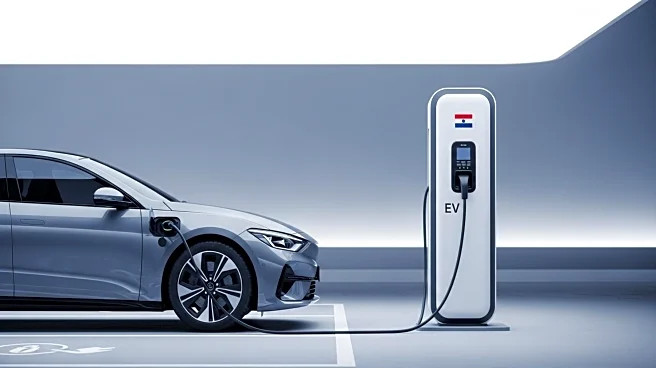What's Happening?
Ford CEO Jim Farley has expressed concerns that President Trump's policies could significantly reduce demand for electric vehicles (EVs) in the U.S. Farley predicts that EV sales could drop to 5% of the market, down from the current 10%. Trump's administration has ended the federal $7,500 EV tax credit and rolled back emissions standards, impacting states' ability to enforce stricter rules. Additionally, Trump's ICE raid on a Hyundai EV battery plant has delayed the project. These policy shifts, along with Elon Musk's growing unpopularity, are causing automakers to reconsider their EV strategies.
Why It's Important?
The potential decline in EV demand due to Trump's policies could have significant implications for the automotive industry and environmental goals. The removal of incentives and rollback of emissions standards may slow the transition to cleaner transportation options, affecting automakers' investment in EV technology. The industry faces challenges in balancing policy changes with consumer demand and environmental commitments. The situation highlights the impact of political decisions on market dynamics and the need for strategic adaptation by automakers.
What's Next?
Automakers are rethinking their strategies in response to the changing policy landscape. Some companies are delaying EV launches, while others are shifting focus back to internal combustion vehicles. The industry must navigate these challenges while considering long-term sustainability goals and consumer preferences. The potential for further policy changes and market shifts requires ongoing adaptation and innovation by automakers to remain competitive and meet environmental targets.
Beyond the Headlines
The situation reflects broader challenges in the automotive industry, where policy decisions and consumer behavior play critical roles in shaping market trends. The impact of Trump's policies on EV demand underscores the importance of aligning government incentives with industry goals to support sustainable transportation. The industry's response to these challenges will influence its future direction and ability to contribute to environmental objectives. The situation serves as a case study in the complex interplay between politics, market dynamics, and technological innovation.










